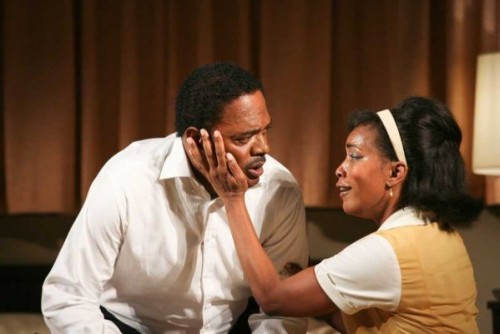Playwright Katori Hall Dreams about Martin Luther King, Jr.
Capturing the Man As He Was is a Tough Climb
By: Susan Hall - Oct 15, 2011
Creating any work about Dr. Martin Luther King Jr. is treacherous. He feels to us like a public figure, but in fact is not. The King family own the copyrights to his speeches and letters. Recently as many as five feature films have been started. The one most closely related to the timeframe of The Mountaintop is Memphis, written and to be helmed by Paul Greengrass (responsible for the magnificent United 93) and distinguished producer Scott Rudin. Universal Pictures nixed the project after they received a call from Andrew Young on behalf of King's heirs.
When playwright Katori Hall tackled The Mountaintop, she must have been aware of how zealously the King estate guarded the reputation of Dr. King. Even elementary school kids can't hear the great man deliver I Have a Dream without paying. Hall has cleverly averted problems with King's remaining three children.
In the play, we get two King speeches, created in his style, but not his very own. No permissions were necessary. What is not immediately apparent in the King portrait being presented until January 15th at the Bernard B. Jacobs Theater in New York is that the entire play is a dream. This avoids any intellectual property issues and inspires a free-wheeling platform. King's fear of death, his premonitions, come to the fore. In a speech given on the afternoon of the day on which the play takes place, April 3, 1968, King passed the torch. He spoke to the future standbearers of the movement and urged them to carry on. He seemed to know that his time on earth was going to be cut short. In a phone conversation with his wife early in the play there is a glancing reference to threatening calls the family received all the time. President Kennedy had been assassinated. Malcolm X was shot down. We are a violent country.
When a sassy and unusual chamber maid delivers coffee to Dr. King's motel room, while he is preparing a speech for the next day, he at first responds to her charm with humor. They banter back and forth sparring with words. This is no Dominique Strauss Kahn situation. Not at all. Instead, as it begins to snow outside the window in Memphis and in April, King's fear overtakes him. We are told, by Dr. King himself, that it is the experience of fear that defines us as human.
Without revealing the onstage surprises, it becomes clear that the play is about two icons in human garb: King and the chamber maid Camae who has an unusual origin. She is here to help King with his fear and also to take the oars of the boat and row him across the Styx. Certainly Camae makes King's last hours lively and fun, but not in a way that would be conventionally off-putting.
The drama is not real. We are in a dreamlike nightmare. Having charming company makes the nightmare more palatable, but it is nonetheless a nightmare.
Hall creates a compelling evening of theater. One wishes that the constraints of dream had been directed more securely by Kenny Leon. Bassett successfully goes for the complexity. Samuel L. Jackson does not. Dreams presented by live actors on stage in real time are very difficult to portray. Given that challenge this production does not succeed. Even King's vision of the future is not imaginatively drawn. It looks more like an exhibit from the LBJ Museum in Austin than a William Blake etching. Yet Hall has put up a portrait of King that is more real than most of the ones that have King's family's stamp of approval.


